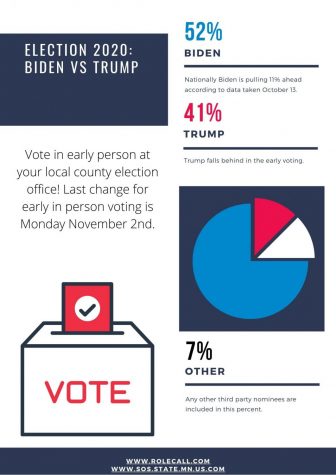Political discourse dominates the internet. Internet activism and instant party division can be found in every topic covered online.
[STAFF EDITORIAL] It’s not always partisan
September 23, 2020

Safe at home. Defund the police. Wildfires across the west. A hotly contested election, resting on democracy as we know it is merely a month away, and political activism— specifically among students— is surging. In the last year, students have made a splash using their personal social media accounts in order to spread awareness and express their opinions. The results are already showing up across the U.S, specifically in Minneapolis, where fundraising is being used to help rebuild the Lake Street Community. However, for every story of a business being repaired, or family being helped out financially through the use of the internet, there is another about the schism in the U.S. that social media chat rooms and online political debates have created. Because of this fact, despite being used with the intent of bringing people together, the increase in activism across the internet has led to people being driven even further apart ideologically.
While some issues naturally lend themselves to political debate, non-partisan topics have been hijacked by political agendas instead of addressing the issues at hand. It is seen in sports, where the Big Ten Conference announced a reversal of their original decision, which was made earlier this month, not to play football for the 2020 season due to COVID-19 concerns last week. This decision, and the one made prior, seemingly has nothing to do with politics but instead with whether Athletic Directors and medical professionals believed student athletes could play safely. However, within the hour, the topic was trending on Twitter and the new-age political discourse was already taking shape, especially because many southern, traditionally conservative, states decided their college football seasons must go on. Ironically, an entirely different game was going on. This game, like football, has two teams: the Republicans and the Democrats. Insults hurled across the web as the President and his adversaries tweeted their own back and forth. What was lost in online discussion was whether college students would be safe playing football in the fall. Each political party was looking to score points and win, through the use of logical fallacy and name calling.
No, I want Big Ten, and all other football, back – NOW. The Dems don’t want football back, for political reasons, but are trying to blame me and the Republicans. Another LIE, but this is what we are up against! They should also open up all of their Shutdown States.
— Donald J. Trump (@realDonaldTrump) August 28, 2020
It’s seen in the arts, like the recent discourse surrounding Netflix’s Cuties, a film that has created controversy due to its alleged sexualizing of minors. Defenders of the film have claimed that the scenes in question are done with a purpose. No matter the side someone falls on for this issue, it is quite clear that the argument should be based around morals and the intent of art. Instead, some media outlets have claimed that the backlash against the film is coming from right-wing extremists. These claims turned the issue into another political battle on the internet. In this debate, as well, another detriment of the overpolitization of issues can be seen. This issue is the inability to find bipartisanship in the internet age. This trend is largely because it has become taboo for members of one party to agree with members of the other. By turning the issue of Cuties, for example, political, the online discourse changed from general agreement that the movie may have crossed the line into one in which people had to decide whether or not they could still believe that due to it being seen as an alt-right viewpoint.
Looking at how the internet has turned into a place of divisive political debate, it may be a surprise that, in general, Americans have more in common on issues than disagreement, according to a Pew Research poll in 2019. This is likely a surprise because the internet age has led each side of the political spectrum to lose hope in the idea of finding common ground with the other. According to a more recent 2020 Pew Research poll, just 27% of Republicans and 28% of Democrats believe that “people agree on basic facts even if they disagree politically.” This idea of the inability to agree on anything between the two sides is likely the root of the issues that are seen in online discourse and why many see the need to politicize issues. It is also of note that according to political scientists, Donald Trump is the most divisive president in U.S. history, which has certainly added to the hostility. People have very strong feelings about the president, and because of that they are more likely to defend or attack him, and less likely to find common ground with each other.
No matter the social media platform, whether it be Tiktok (an app with a user base that is 60% generation Z) or Instagram, politics have blitzed the internet. It is important to recognize that politics will consume daily life and that this is something to resist. Unfollow or snooze some political pages. Resist the urge to click share while scrolling through Tiktok or an Instagram story criticizing a political side for being a “snowflake” or a “Trumper.” Pause and reflect on whether a social issue is truly political before engaging because the over politicization of issues will only lead to divisiveness. Don’t lose sight of the fact that there often is more that unites us, than divides us.